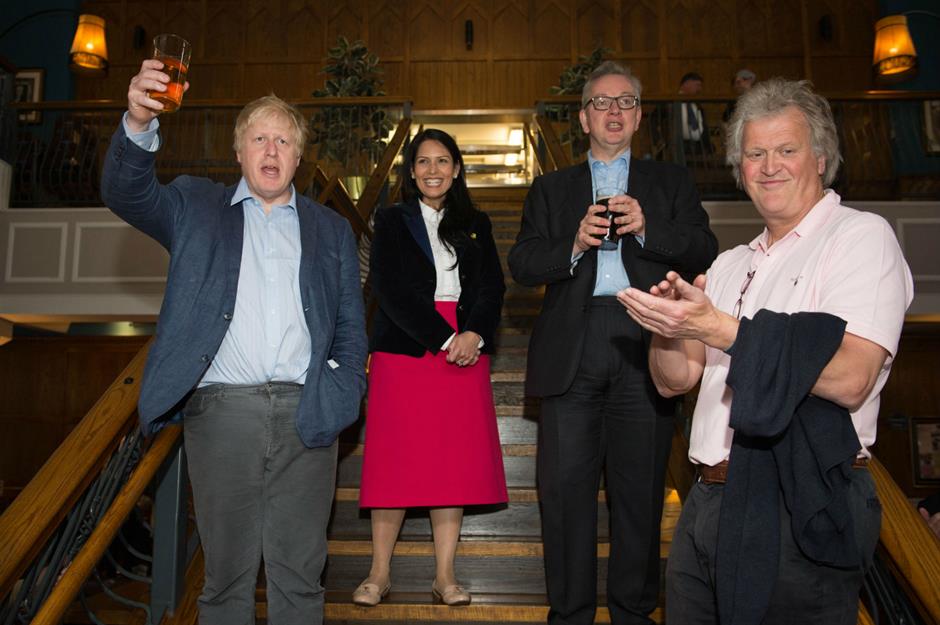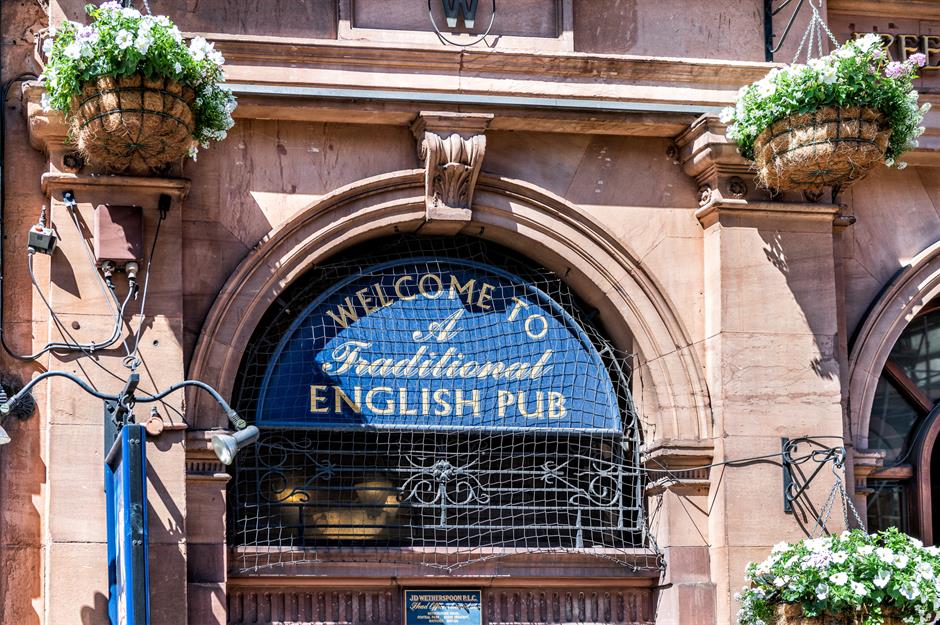Wetherspoons' Tim Martin's incredible success story
A no-frills pub phenomenon
Whether you love it for its cheap and cheerful dining and drinks or loathe it for its no-frills ethos and corporate ambience, Wetherspoons is now a British institution. From humble beginnings as a lone pub in a former north London bookies to a ubiquitous 900-strong chain across the UK and Ireland with an annual turnover of £1.6 billion, we track the rise of one of Britain’s biggest brands, and the story of its outspoken and flagrantly pro-Brexit founder Tim Martin (pictured far right).
Martin’s Free House
On 9 December 1979, Norwich-born entrepreneur Tim Martin opened his first pub in Muswell Hill, north London, fittingly named Martin’s Free House. That summer Martin had qualified as a barrister from the University of Nottingham but he decided to turn his back on the law and study a different kind of bar.
A swift name change
Martin’s Free House had barely been going a month before its founder renamed it JD Wetherspoon. The name is said to have been inspired by Martin’s primary school teacher, Mr Wetherspoon, who reportedly told a young Martin he’d never make it in business. The JD part of the name came from the character Sheriff JD 'Boss' Hogg from the Dukes of Hazzard TV series.
Following in Walmart's footsteps
The pub chain's success is largely down to its approach to its supply chain. Rather than be beholden to breweries, Wetherspoons has its own taps and distribution network so it can keep its prices down. This tactic is inspired by Martin's hero, Walmart founder Sam Walton (pictured in his college years), whose 10 rules for business, such as 'Listen to everyone in your company' and not to 'be beholden to... supply chain', Martin tries to follow to the letter.
Discover more about Walton's tactics in Meet the Waltons: the family story behind Walmart's staggering success
The oldest pub in the chain
Profits at last
London-centric early years
A million-pound profit
Floating on the London Stock Exchange
A mere three years later JD Wetherspoon was valued at £45.6 million, sustained success that, in 1992, saw the company float on the London Stock Exchange with an initial price of £1.60 a share.
Expansion out of London
A market-defying vision
Martin is known for his brave business decisions, including some that seem like they may be the result of a drinking session. One such decision was to convert shops into pubs, which was derided in a column in The Times when the chain was floating on the stock exchange and suggested investors abandon the company. But Martin held firm, as did the investors, proving that persistent determination can pay off.
FTSE 250 status
Curry Club comes to town
Branching out to accommodation
Steak Club arrives
Pub Company of the Year
'No TV or music' rule banished
Wetherspoons snaps up Lloyds No.1s
Flushed with success
Breakfast revolution
The company began its breakfast revolution in 2002, opening all its pubs for breakfast six days a week. This was a great success and in 2015 The Guardian named it the nation's fifth favourite breakfast destination.
Share price tumbles
Despite its multi-award-winning status, in 2002 Wetherspoons took an uncharacteristic knock when the company’s shares fell by 28% after issuing a warning that profits would be down 10% on expectations. The expansion drive was scaled back, with Martin blaming "increased red tape and taxation", two things he has strongly fought against since.
Discover the 30 companies that seen their share price plummet in 2018
Taking a sabbatical
Making the influential list
Hands-on management
Despite supposedly taking more of a back seat, Martin continued his hands-on management style. In 2005 he admitted to visiting at least 15 of his pubs a week, tasting at least two beers in every pub he visits.
Free Wi-Fi for all
Most Responsible Managed Pub Chain
A step ahead on the smoking ban
Wedding bells ring
Fish Friday launched
Wetherspoons hits Ireland
Britain’s first motorway service station pub
Backing Leave
Never one to steer clear of the limelight, Martin was a high-profile lobbyist for the Vote Leave campaign in the 2016 EU referendum. Such was the Wetherspoons founder’s passion to Leave the EU that he donated £200,000 to the Leave campaign.
Check out Before Brexit: Britain's biggest exports may surprise you
Goodbye social media
Causing controversy once more, in April 2018 Martin decided to close all Wetherspoons' social media accounts. The move shocked commentators, though Martin didn’t seem at all phased, stating: “I don’t believe that closing these accounts will affect our business whatsoever.”
Ditching European drinks
Several months later, Wetherspoons raised eyebrows once again when its pro-Brexit chairman announced plans to sell more drinks from Britain and non-EU breweries ahead of Brexit. The move came into play in all Wetherspoons pubs from 9 July 2018. “This move helps us to broaden our horizons so that we create an improved offer for the two million customers who visit our pubs each week,” Martin commented.
The mighty get mightier
And the headlines don't seem to be hurting the business one bit with the latest figures painting a rosy picture for the pub chain. In May 2018 the company boasted a 20.6% increase in pre-tax profits. The chain’s founder retains a realistic ethos on his company’s resounding success, saying: “We’ve had a good run for a few years now. The cliché is that trees don’t grow to the sky, so at some point we’re not going to have 6% like-for-like sales. We have to make sure we put that message across.” According to the Sunday Times Rich List, Martin now has an estimated net worth of £448 million.
Another Brit who's no stranger to success is Jim Ratcliffe, read the story of Britain's richest man's incredible journey

